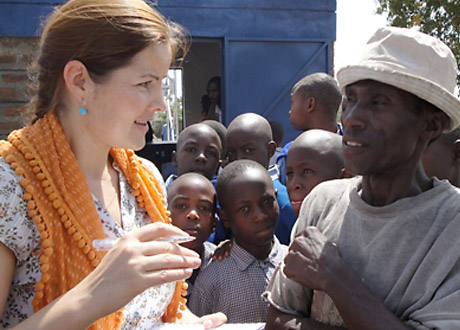A Dialogue on Business Anthropology
Dear Robert:
Thank you for this article and review. I found it very helpful. Your literature review has me pondering some questions about the state of business anthropology. First is the question of use of "profit" in the following:
"However, in Gwynne’s view there is a major methodological difference between business anthropology and other kinds of applied anthropology because in most cases the fundamental purpose of private sector economic activity is to make profit, and as such, there is always full of competitions in the business world. (Gwynne, 2003)." (emphasis added)
Thank you for this article and review. I found it very helpful. Your literature review has me pondering some questions about the state of business anthropology. First is the question of use of "profit" in the following:
"However, in Gwynne’s view there is a major methodological difference between business anthropology and other kinds of applied anthropology because in most cases the fundamental purpose of private sector economic activity is to make profit, and as such, there is always full of competitions in the business world. (Gwynne, 2003)." (emphasis added)
This statement appears to be more "ideological" rather than "scientific." Since when has the goal of business NOT to make a profit?
As a cultural universal, human beings engage in economic activity. Throughout history they have sought to create or accumulate a surplus as an insurance policy against bad times. Such surpluses are "profits." In my experience, business organizations are a particular type of social structure created by individuals and/or groups of individuals in order to carry out and conduct economic activity for the benefit of the owners and their customers. Without profits, there is little reason or incentive to conduct business.
However, I believe that there are a number of anthropological questions here that are far less "ideological" and far more scientifically interesting. For example: "what does "profit" mean in different socio/cultural contexts?", "how does a business measure "profit" beyond "generally accepted accounting standards?" "how does a business translate its profit into "good will" or vis-a-versa? "Are there differences in the cultural criteria a business uses to value a business opportunity, and what are they?"
I find the following, attributed to Gwynne, to be rather naive.
 Moreover, because when working for highly competitive business firms business anthropologists usually face a difficult task in being “open” with results, publications, and sometimes must undergo through severe concerns about professional ethical questioning (Gwynne, 2003)
Moreover, because when working for highly competitive business firms business anthropologists usually face a difficult task in being “open” with results, publications, and sometimes must undergo through severe concerns about professional ethical questioning (Gwynne, 2003)This sounds like the subject for being blamed for behaving like the subject. What problems the business environment presents to the anthropological study of business are really the anthropologist's problem, not the business firm's. If one goes into an indigenous community and finds that they don't access to Facebook or Twitter so the anthropologist can not post her or his observations back to the students in the classroom, should the indigenous community be blamed?
Business plans, marketing information, trade secrets and other intellectual property is proprietary. Intellectual property is legally recognized as having a true economic value to the business. Any anthropologist, academic or applied, should understand and accept this if they want to work in the business environment.
Further, is there any ethical difference between the confidentiality one would extend the indigenous community and what one extends to a business firm? Why should the business anthropologist expect to be accepted into the business community, if the anthropologist can't accept the local rules over his/her vague "professional" ethics? Should there be a more realistic code that fits the business context that the business anthropologist can subscribe to rather than trying to fit the business into an ethical system based on academic principles of ethics?
Another interesting point you raised is:
... the fourth field can be termed as anthropology of competitive intelligence and knowledge management, focus on the study of unique methods by anthropologists to be used in competitive intelligence and knowledge management (Tian 2009).
... the fourth field can be termed as anthropology of competitive intelligence and knowledge management, focus on the study of unique methods by anthropologists to be used in competitive intelligence and knowledge management (Tian 2009).
I recognize that this (competitor intelligence) is often the reason an anthropologist might be hired by a business firm, either as an employee or as a consultant. However, in the end, this raises the broader question. In American culture, at least, business is often referred to metaphorically as WAR.So, What is the difference between an anthropologist hired by a private business corporation to do competitor intelligence research, and the anthropologist hired by the military to do cultural terrain analysis?
Is there a different code of ethics based on the identity of the client, i.e. a form of "racial" profiling? Or, should there be a different code of ethics based on the purpose of the activity bring carried out regardless who the client is?
As you can see, you have me thinking. Good job!
Again, thank you for the article and summary.
Barry
Is there a different code of ethics based on the identity of the client, i.e. a form of "racial" profiling? Or, should there be a different code of ethics based on the purpose of the activity bring carried out regardless who the client is?
As you can see, you have me thinking. Good job!
Again, thank you for the article and summary.
Barry
A Discussion with Barry Bainton
Thanks for your good comments, which push me to invite you write an article for the International Journal of Business Anthropology. You have made three excellent, and yet, arguable, points: 1) what are the purposes of business firms (profits vs. nonprofits); 2 shall we (anthropologists) adapt to the subjects’ environment (both nature and social) and rules or shall we blame the subjects for not sharing the same environment and rules as ours; and 3) how shall we deal with our professional ethic codes, shall we have our professional ethic codes adapted to the subjects’ society or shall we must insist on our own.
I believe each of these three issues is worth of debating and discussing among our colleagues. I would like to particularly invite you write something on ethic issues and using competitive intelligence as the case. Dr. Ann Jordan is in the position that we (anthropologists) should not involve ourselves into CI projects, while Dr. Alf Walle and I, among several others, believe that anthropologists do have the advantages in doing CI projects. I believe it is a very interesting topic to discuss and to debate among business anthropologists.
Please contact me by email: rgtian@yahoo.comThank you again.
Robert










